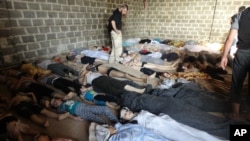Five key global diplomats launched talks Tuesday aimed at reaching consensus on a Western resolution demanding the destruction of Syria's chemical stockpile.
The talks in New York brought together envoys from the United States, Russia, Britain, France and China, as delegates from nearly 190 other nations heard U.N. Secretary-General Ban Ki-moon officially open the 68th session of the General Assembly.
Tuesday's talks, set to extend through the week, followed the release Monday by U.N. investigators of a report confirming a deadly August 21 sarin gas attack outside the Syrian capital. Ban said the gathered evidence "indisputably" and "overwhelmingly" confirms the use of the nerve agent on a relatively large scale.
U.S. President Barack Obama and other Western leaders cite intelligence showing the attack killed 1,400 people in the rebel-held Damascus suburb, Ghouta. They also alleged that troops loyal to Syrian President Bashar al-Assad launched the attack - a charge Assad denies and Russia and China dispute.
Despite weeks of contentious disagreement about the origins of the attack, Russia - a traditional Syrian ally - and Western powers have agreed to work together toward a U.N resolution on the removal of the Syrian arsenal.
In Moscow, Russian Foreign Minister Sergei Lavrov said the attack was likely a rebel "provocation" aimed at gaining outside military help in the push to remove Assad from power.
Lavrov's French counterpart, Laurent Fabius, speaking alongside the Russian diplomat, said the U.N. evidence "seems to leave no doubt" that Syrian forces launched the attack.
The U.N. report does not assess blame for the attack. But Washington and its Western allies say the report's supporting evidence, including trajectory readouts on poison-filled rockets, clearly shows Syrian government responsibility.
The talks in New York brought together envoys from the United States, Russia, Britain, France and China, as delegates from nearly 190 other nations heard U.N. Secretary-General Ban Ki-moon officially open the 68th session of the General Assembly.
Tuesday's talks, set to extend through the week, followed the release Monday by U.N. investigators of a report confirming a deadly August 21 sarin gas attack outside the Syrian capital. Ban said the gathered evidence "indisputably" and "overwhelmingly" confirms the use of the nerve agent on a relatively large scale.
U.S. President Barack Obama and other Western leaders cite intelligence showing the attack killed 1,400 people in the rebel-held Damascus suburb, Ghouta. They also alleged that troops loyal to Syrian President Bashar al-Assad launched the attack - a charge Assad denies and Russia and China dispute.
Despite weeks of contentious disagreement about the origins of the attack, Russia - a traditional Syrian ally - and Western powers have agreed to work together toward a U.N resolution on the removal of the Syrian arsenal.
In Moscow, Russian Foreign Minister Sergei Lavrov said the attack was likely a rebel "provocation" aimed at gaining outside military help in the push to remove Assad from power.
Lavrov's French counterpart, Laurent Fabius, speaking alongside the Russian diplomat, said the U.N. evidence "seems to leave no doubt" that Syrian forces launched the attack.
The U.N. report does not assess blame for the attack. But Washington and its Western allies say the report's supporting evidence, including trajectory readouts on poison-filled rockets, clearly shows Syrian government responsibility.





